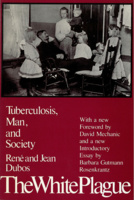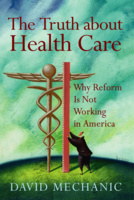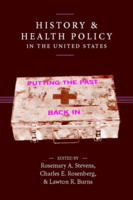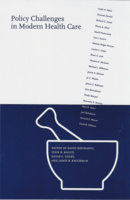David Mechanic
Showing 1-4 of 4 items.
The White Plague
Tuberculosis, Man and Society
Rutgers University Press
DuBos et. al. examine the social aspects of the TB epidemic, along with some of the biological factors. They show how TB was romanticized, how it was portrayed as a demon coming to rob the healthy of life, and how it sparked scientific invention—in particular the stethoscope. The introduction is wonderful as it lays out the basic parts of the book.
- Copyright year: 1987
The Truth About Health Care
Why Reform is Not Working in America
Rutgers University Press
In The Truth about Health Care, David Mechanic explains how health care in America has evolved in ways that favor a myriad of economic, professional, and political interests over those of patients. While money has always had a place in medical care, "big money" and the quest for profits has become dominant, making meaningful reforms difficult to achieve. Mechanic acknowledges that railing against these influences, which are here to stay, can achieve only so much. Instead, he asks whether it is possible to convert what is best about health care in America into a well functioning system that better serves the entire population.
- Copyright year: 2006
History and Health Policy in the United States
Putting the Past Back In
Edited by Rosemary A. Stevens, Charles E. Rosenberg, and Lawton R. Burns; Foreword by David Mechanic; Introduction by Rosemary A. Stevens
Rutgers University Press
In our rapidly advancing scientific and technological world, many take great pride and comfort in believing that we are on the threshold of new ways of thinking, living, and understanding ourselves. But despite dramatic discoveries that appear in every way to herald the future, legacies still carry great weight. Even in swiftly developing fields such as health and medicine, most systems and policies embody a sequence of earlier ideas and preexisting patterns.
In History and Health Policy in the United States, seventeen leading scholars of history, the history of medicine, bioethics, law, health policy, sociology, and organizational theory make the case for the usefulness of history in evaluating and formulating health policy today. In looking at issues as varied as the consumer economy, risk, and the plight of the uninsured, the contributors uncover the often unstated assumptions that shape the way we think about technology, the role of government, and contemporary medicine. They show how historical perspectives can help policymakers avoid the pitfalls of partisan, outdated, or merely fashionable approaches, as well as how knowledge of previous systems can offer alternatives when policy directions seem unclear.
Together, the essays argue that it is only by knowing where we have been that we can begin to understand health services today or speculate on policies for tomorrow.
In History and Health Policy in the United States, seventeen leading scholars of history, the history of medicine, bioethics, law, health policy, sociology, and organizational theory make the case for the usefulness of history in evaluating and formulating health policy today. In looking at issues as varied as the consumer economy, risk, and the plight of the uninsured, the contributors uncover the often unstated assumptions that shape the way we think about technology, the role of government, and contemporary medicine. They show how historical perspectives can help policymakers avoid the pitfalls of partisan, outdated, or merely fashionable approaches, as well as how knowledge of previous systems can offer alternatives when policy directions seem unclear.
Together, the essays argue that it is only by knowing where we have been that we can begin to understand health services today or speculate on policies for tomorrow.
- Copyright year: 2006
Policy Challenges in Modern Health Care
Rutgers University Press
Bringing together twenty-five of the nation’s leading experts in health care policy and public health, this book provides a much-needed perspective on how our health care system evolved, why we face the challenges that we do, and why reform is so difficult to achieve. The essays tackle tough issues including: socioeconomic disadvantage, tobacco, obesity, gun violence, insurance gaps, the rationing of services, the power of special interests, medical errors, and the nursing shortage. Linking the nation’s health problems to larger political, cultural, and philosophical contexts, Policy Challenges in Modern Health Care offers a compelling look at where we stand and where we need to be headed.
- Copyright year: 2005
Stay Informed
Subscribe nowRecent News




